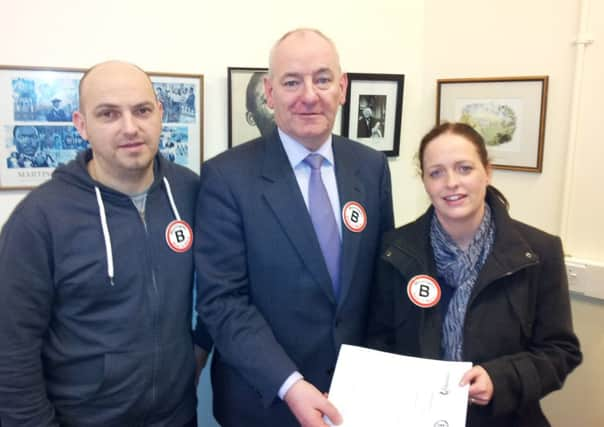Campaign in little Jamie’s namehelping to win Meningitis battle


The SDLP MP praised Emma and Darren Cowey after a deal was struck to make a life-saving vaccine against the deadly Meningitis B disease (Bexsero) available for free on the NHS for babies in Londonderry and across Northern Ireland.
He said: “My own constituents Darren and Emma Cowey were typical of the character of the campaign that was fought – having lost their young son to Meningitis B and wanting vaccination to spare others from that risk.
Advertisement
Hide AdAdvertisement
Hide Ad“I have spoken to them today to congratulate them on the difference that they have helped to make by their generous campaigning work for other parents and children.”
Since Jamie passed away to the killer disease at the Royal Victoria Hospital on Halloween in 2004, less than 24 hours after the first symptoms developed, the Waterside couple have been tireless campaigners for a vaccine.
Mr Durkan, who tabled parliamentary motions and campaigned at Westminster with the charity Meningitis Now calling on the government to introduce the new vaccine, explained how it will make a difference.
“This vaccine can prevent 82 per cent of cases of Meningitis B and the lifelong damage and loss of life it tragically brings. Bexsero will also be effective against incidents of Men W which have shown an increase in England but thankfully not here as yet.
Advertisement
Hide AdAdvertisement
Hide Ad“I really appreciate that the Health Minister Jim Wells contacted me ahead of this announcement to stress that the decision by Whitehall will be ‘downloaded’ to Northern Ireland as soon as possible – and that he will be moving in sync with Jeremy Hunt on this.
“I also want to commend everyone at Meningitis Now for their compelling campaign over many years. Indeed, this great result is down to the brave and generous work of families and those who have endured Meningitis B’s worst,” he said.
Last year Sue Davie, Chief Executive of Meningitis Now, said: “I find it hard to express how grateful I am for Mark Durkan’s incredible support of our campaign to secure the introduction of the new Men B vaccine.
“Mark’s willingness to always go the extra mile – with the Early Day Motions, encouraging other MPs to get involved (for example helping us to get over 40 MPs along just to a photocall) and introducing the Shadow Chancellor to our campaign has played such a big part and I am so very grateful.”
Advertisement
Hide AdAdvertisement
Hide AdHealth Minister Jim Wells announced on Sunday (March 29) that he has signed off on a vaccine to be included as part of the routine childhood vaccination programme.
The announcement follows the conclusion of negotiations between the Department of Health in England and the vaccine manufacturer GlaxoSmithKline to secure the Men B vaccine at a cost effective price.
Mr Wells said: “Men B is an extremely serious illness that can cause devastating consequences. It can lead to septicaemia (blood poisoning) and around one in every 10 such cases is fatal. Sadly, it is infants and children aged under five years who are most affected. Early diagnosis and antibiotic treatment can lead to a full recovery, but about one in eight cases experience long-term health problems such as amputation, deafness, epilepsy and/or learning difficulties.
“I very much welcome the outcome of the negotiations to secure an effective, safe and cost-effective vaccine to protect against Men B. All four UK Health Ministers had previously accepted the JCVI recommendation to introduce a Men B vaccination programme, subject to the vaccine being procured at a cost effective price. This is very good news and I’m sure all prospective parents will welcome the introduction of a Men B vaccine to the routine childhood vaccination schedule.”
Advertisement
Hide AdAdvertisement
Hide AdSince 2010 we have seen around 25 to 35 cases of Men B each year in Northern Ireland. Men B is now responsible for the vast majority of cases of invasive meningococcal disease in this country.
In the past decade, on average over 1,000 confirmed cases of Men B disease have occurred annually in the UK, although the annual incidence has declined in recent years.
The Minister concluded by saying: “The introduction of a new vaccination programme needs to be carefully planned in order to ensure a sufficient and sustainable supply of the vaccine but my Department will endeavour to ensure that a vaccination programme is in place as quickly as possible to ensure we protect our children from this terrible illness.”